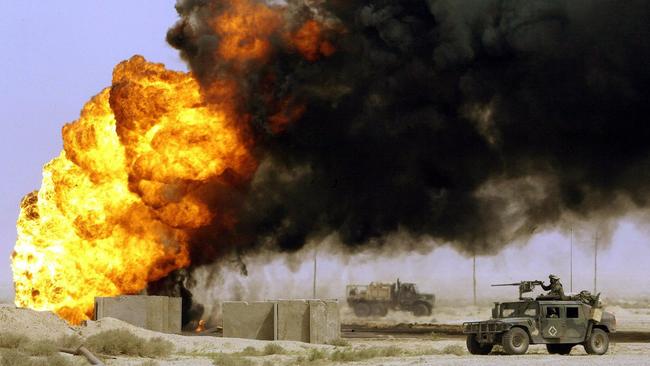How war escalating in the Middle East can hit your hip pocket
An expanding war in the Middle East has already pushed crude oil prices higher, so what does that mean for your hip pocket?

Business
Don't miss out on the headlines from Business. Followed categories will be added to My News.
Just when you thought it was safe to go back to the petrol pump, along comes a fresh escalation in the world’s most unstable region: the Middle East.
Israel and Iran going to-to-toe – and potentially bringing their allies into the fight – could be very bad for financial markets, and can hit hip pockets hard too.
While money matters should not be compared to the tragic loss of life, or the horrific barbarism that terrorist groups display, it pays to understand the financial impacts we all may face.
Oil is the global commodity price that affects us the most.
Even those who drive petrol-free electric vehicles are still impacted by rising oil and gas prices because they fuel inflation globally, leading to higher interest rates, plus there’s an impact on household energy bills.

When oil is up, everything is up – from the cost of running farm machinery to the price of transporting groceries to supermarkets.
Everyone felt this a couple of years ago when oil prices at $US120 a barrel contributed to the highest official inflation figures Australians have seen in decades.
Last month oil was under $US68 a barrel, but has since spiked above $US75 after Iran sent more than 200 missiles into Israel last week, fuelling fears of future disruption to global oil supply.
Before the attack, relatively low oil prices have meant months of fuel falling below $1.70 a litre at Aussie petrol pumps – well below the $2.20-plus people paid a couple of years ago. Every $US1 move in crude oil shifts pump prices about 1c.
The good news for motorists – and home loan borrowers hoping for interest rate cuts – is that oil looks unlikely to head back to its 2022 levels, even with further military escalation in the Middle East.
Speculators say if Israel retaliates to Iran’s missile attacks by bombing Iranian oilfields, which represent about 4 per cent of global supply, oil could rise towards $US80 barrel – but that’s still well below the prices of a couple of years ago.
IG market analyst Tony Sycamore says Israel’s western allies won’t want to see oil prices surging higher because the world is only just getting the post-Covid surge of inflation under control.
“Historically, during Middle Eastern crises over the past three decades, crude oil prices have experienced short-term spikes but eventually returned to align with broader supply and demand dynamics,” Sycamore says.
“For example, after an initial surge from $82.79 to $89.85 following the October 7 Hamas attack, crude prices remain 20 per cent below the October 20 high.”
Sycamore says even if Iran’s oil production drops because of embargoes or military action, other countries can take up the slack. Saudi production could rise as its voluntary supply cuts expire on December 1, while Libyan oil is returning.
He says global demand remains tepid, with China’s economy weak and its transport sector electrification reducing oil’s importance there.
The end result is hopefully we won’t see sharp rises in petrol and the inflation that this can bring.
However, the world seems crazier than usual right now, and anything can happen. So does that mean investors should rush out and buy oil company shares?
Share specialists say while energy stocks today look a lot cheaper than the surging tech and financial sectors, there is long-term downward pressure on global demand for oil.
If you like a bet, perhaps you could, but remember you’d be betting on a global catastrophe to send prices soaring. If that happens, panicking and weaker stock markets might offset many of the oil stock gains.
Originally published as How war escalating in the Middle East can hit your hip pocket





